-
 Bitcoin
Bitcoin $107,443.3008
-1.17% -
 Ethereum
Ethereum $2,494.2503
-0.63% -
 Tether USDt
Tether USDt $1.0003
0.00% -
 XRP
XRP $2.2496
2.23% -
 BNB
BNB $658.7569
0.63% -
 Solana
Solana $154.9826
1.94% -
 USDC
USDC $1.0000
0.01% -
 TRON
TRON $0.2799
1.07% -
 Dogecoin
Dogecoin $0.1659
-1.78% -
 Cardano
Cardano $0.5745
0.25% -
 Hyperliquid
Hyperliquid $39.7005
0.13% -
 Bitcoin Cash
Bitcoin Cash $519.5989
3.78% -
 Sui
Sui $2.7874
-2.40% -
 Chainlink
Chainlink $13.3762
-1.69% -
 UNUS SED LEO
UNUS SED LEO $9.0784
-0.64% -
 Avalanche
Avalanche $17.9846
-2.81% -
 Stellar
Stellar $0.2390
-0.06% -
 Toncoin
Toncoin $2.9028
0.25% -
 Shiba Inu
Shiba Inu $0.0...01147
-2.17% -
 Litecoin
Litecoin $86.6956
-1.27% -
 Hedera
Hedera $0.1508
-0.50% -
 Monero
Monero $322.6222
3.26% -
 Polkadot
Polkadot $3.4124
-2.99% -
 Dai
Dai $0.9999
0.00% -
 Bitget Token
Bitget Token $4.5434
-1.97% -
 Ethena USDe
Ethena USDe $1.0002
0.00% -
 Uniswap
Uniswap $7.1562
-2.61% -
 Aave
Aave $275.8830
-1.02% -
 Pepe
Pepe $0.0...09790
-4.04% -
 Pi
Pi $0.5018
-5.09%
How to calculate HTX's contract liquidation price?
The liquidation price on HTX is crucial for risk management, varying by contract type and calculated using specific formulas based on entry price, leverage, and margin rate.
Apr 05, 2025 at 08:07 pm
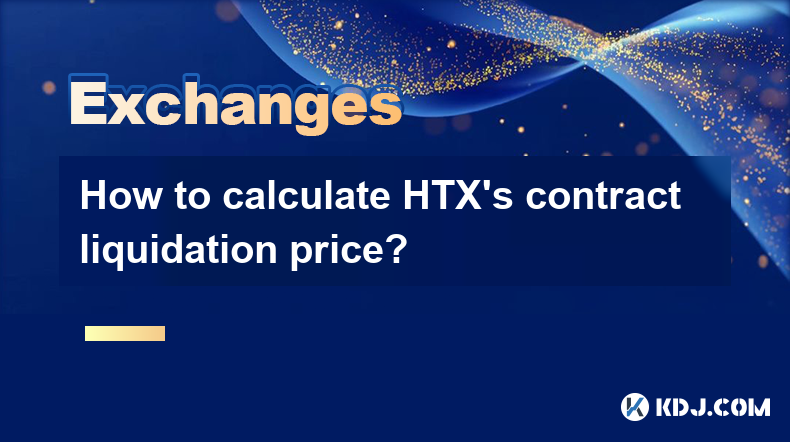
Calculating the liquidation price of a contract on HTX (formerly known as Huobi) is crucial for traders to manage their risk effectively. The liquidation price is the price at which a position is automatically closed due to insufficient margin. Understanding how to calculate this price can help traders avoid unexpected liquidations and manage their positions more effectively.
Understanding Margin and Leverage
Before delving into the calculation of the liquidation price, it's essential to understand the concepts of margin and leverage. Margin is the amount of funds required to open and maintain a position, while leverage allows traders to control a larger position with a smaller amount of capital. On HTX, leverage can range from 1x to 125x, depending on the contract and the trader's account settings.
Types of Contracts on HTX
HTX offers various types of contracts, including Inverse Perpetual Contracts and Linear Perpetual Contracts. The calculation of the liquidation price can differ slightly between these types due to their different underlying mechanisms.
- Inverse Perpetual Contracts are denominated in cryptocurrencies and settled in the same cryptocurrency. The value of the contract is inversely related to the price of the underlying asset.
- Linear Perpetual Contracts are denominated in USDT and settled in USDT. The value of the contract moves linearly with the price of the underlying asset.
Formula for Calculating Liquidation Price
The general formula for calculating the liquidation price on HTX depends on whether you are holding a long or short position. Here are the formulas for both types of contracts:
For Long Positions:
- Inverse Perpetual Contracts:
[
\text{Liquidation Price} = \frac{\text{Entry Price}}{(1 + \text{Maintenance Margin Rate} \times \text{Leverage})}
] - Linear Perpetual Contracts:
[
\text{Liquidation Price} = \text{Entry Price} \times (1 - \frac{1}{\text{Leverage}} + \text{Maintenance Margin Rate})
]
For Short Positions:
- Inverse Perpetual Contracts:
[
\text{Liquidation Price} = \frac{\text{Entry Price}}{(1 - \text{Maintenance Margin Rate} \times \text{Leverage})}
] - Linear Perpetual Contracts:
[
\text{Liquidation Price} = \text{Entry Price} \times (1 + \frac{1}{\text{Leverage}} - \text{Maintenance Margin Rate})
]
Step-by-Step Calculation Guide
To calculate the liquidation price, follow these steps:
- Determine the type of contract you are trading (Inverse or Linear Perpetual Contract).
- Identify your entry price, which is the price at which you opened your position.
- Check your leverage, which is the amount of leverage you are using for the position.
- Find the maintenance margin rate, which is the minimum amount of margin required to keep the position open. This rate can vary depending on the contract and is set by HTX.
Once you have these values, you can plug them into the appropriate formula based on whether you are holding a long or short position and the type of contract.
Example Calculation
Let's go through an example to illustrate how to calculate the liquidation price for a long position on an Inverse Perpetual Contract.
- Entry Price: $10,000
- Leverage: 10x
- Maintenance Margin Rate: 0.5%
Using the formula for long positions on Inverse Perpetual Contracts:
[
\text{Liquidation Price} = \frac{10,000}{(1 + 0.005 \times 10)} = \frac{10,000}{1.05} \approx 9,523.81
]
So, the liquidation price for this position would be approximately $9,523.81.
Using HTX's Platform to Verify Liquidation Price
HTX provides tools within its trading platform to help traders verify their liquidation prices. Here's how you can do it:
- Log into your HTX account and navigate to the trading interface.
- Select the contract you are trading.
- Open a position or view an existing position.
- Look for the liquidation price displayed on the position details. HTX automatically calculates and shows this value based on your current position parameters.
Factors Affecting Liquidation Price
Several factors can affect the liquidation price of a contract on HTX:
- Leverage: Higher leverage increases the risk of liquidation as it reduces the margin required to maintain the position.
- Maintenance Margin Rate: A higher maintenance margin rate means a larger buffer is needed to avoid liquidation.
- Position Size: Larger positions require more margin, which can affect the liquidation price.
- Market Volatility: High volatility can lead to rapid price movements, increasing the likelihood of hitting the liquidation price.
Managing Risk to Avoid Liquidation
To manage the risk of liquidation, traders can take several steps:
- Use Stop-Loss Orders: Setting a stop-loss order can help limit losses and prevent a position from reaching the liquidation price.
- Monitor Margin Levels: Regularly check your margin levels to ensure they are sufficient to maintain your positions.
- Adjust Leverage: Lowering leverage can increase the buffer between the current price and the liquidation price.
- Diversify Positions: Spreading risk across multiple positions can reduce the impact of a single position being liquidated.
Frequently Asked Questions
Q: Can the liquidation price change after opening a position?
A: Yes, the liquidation price can change if you adjust your position size, leverage, or if the maintenance margin rate changes. Always monitor your position details on HTX to stay updated on your current liquidation price.
Q: What happens if my position is liquidated?
A: If your position is liquidated, HTX will automatically close your position at the liquidation price. Any remaining margin after covering losses and fees will be returned to your account.
Q: Is there a way to avoid liquidation entirely?
A: While it's impossible to avoid liquidation entirely, you can minimize the risk by using stop-loss orders, monitoring your margin levels, and adjusting your leverage and position sizes according to market conditions.
Q: How does HTX handle partial liquidations?
A: HTX may implement partial liquidations in certain scenarios to reduce the risk of full liquidation. This means that only a portion of your position might be closed to bring your margin back to the required level, allowing you to maintain the rest of your position.
Disclaimer:info@kdj.com
The information provided is not trading advice. kdj.com does not assume any responsibility for any investments made based on the information provided in this article. Cryptocurrencies are highly volatile and it is highly recommended that you invest with caution after thorough research!
If you believe that the content used on this website infringes your copyright, please contact us immediately (info@kdj.com) and we will delete it promptly.
- North Korea's Cyber Plot: Funding Weapons Development Through Virtual Heists
- 2025-07-01 10:30:12
- Undervalued Crypto Tokens: Compute Tokens Stealing the Show?
- 2025-07-01 10:50:12
- XRPL EVM Sidechain: Unleashing Smart Contracts and Cross-Chain DeFi on XRP
- 2025-07-01 10:30:12
- Archaeology Unearths Ancient Coin Moulds: A Glimpse into Indo-Greek Trade in Gujarat
- 2025-07-01 10:50:12
- MAGACOIN FINANCE: Altcoin Returns & the Early Adoption Advantage
- 2025-07-01 11:10:12
- Neo Pepe: Is This Presale the Crypto Opportunity You've Been Waiting For?
- 2025-07-01 11:10:12
Related knowledge
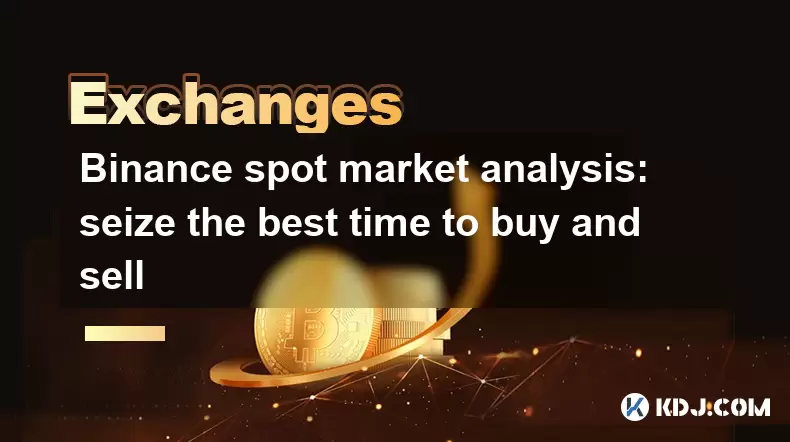
Binance spot market analysis: seize the best time to buy and sell
Jun 19,2025 at 04:56pm
Understanding the Binance Spot MarketThe Binance spot market is one of the most popular platforms for cryptocurrency trading globally. It allows users to trade digital assets at current market prices, making it essential for traders aiming to buy low and sell high. Unlike futures or margin trading, spot trading involves direct ownership of the asset aft...
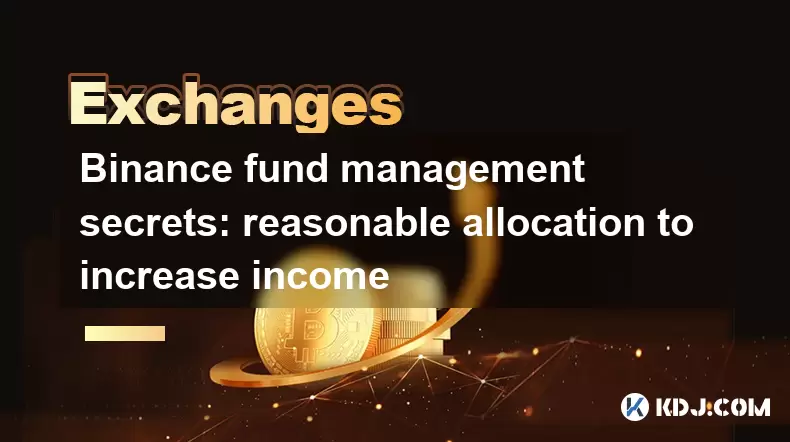
Binance fund management secrets: reasonable allocation to increase income
Jun 22,2025 at 02:29pm
Understanding Binance Fund ManagementBinance fund management involves strategic allocation of your cryptocurrency assets to optimize returns while managing risk. The key to successful fund management lies in understanding how different investment options on the Binance platform can be utilized to create a diversified portfolio. This includes spot tradin...
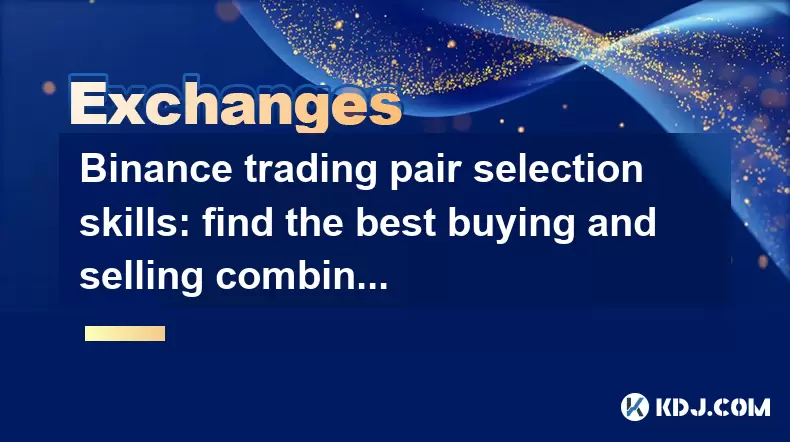
Binance trading pair selection skills: find the best buying and selling combination
Jun 23,2025 at 02:49am
Understanding the Basics of Trading Pairs on BinanceBefore diving into trading pair selection skills, it's essential to understand what a trading pair is. On Binance, a trading pair refers to two cryptocurrencies that can be traded against each other. For example, BTC/USDT means Bitcoin is being traded against Tether. Each trading pair has its own liqui...
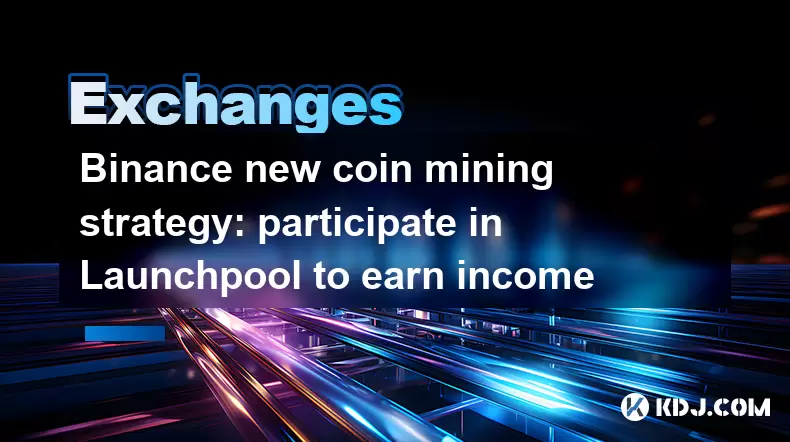
Binance new coin mining strategy: participate in Launchpool to earn income
Jun 23,2025 at 11:56am
What is Binance Launchpool and how does it work?Binance Launchpool is a feature introduced by the world’s largest cryptocurrency exchange, Binance, to allow users to earn new tokens through staking. This platform enables users to stake their existing cryptocurrencies (such as BNB, BUSD, or other supported assets) in exchange for newly launched tokens. T...
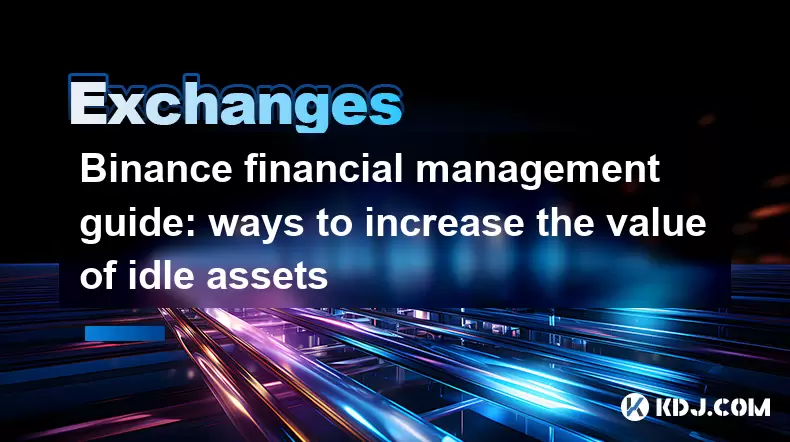
Binance financial management guide: ways to increase the value of idle assets
Jun 19,2025 at 11:22pm
Understanding Idle Assets in the Cryptocurrency SpaceIn the fast-paced world of cryptocurrency, idle assets refer to digital currencies that are not actively being used for trading, staking, or yield farming. Holding these funds in a wallet without utilizing them means missing out on potential growth opportunities. Binance, as one of the leading platfor...
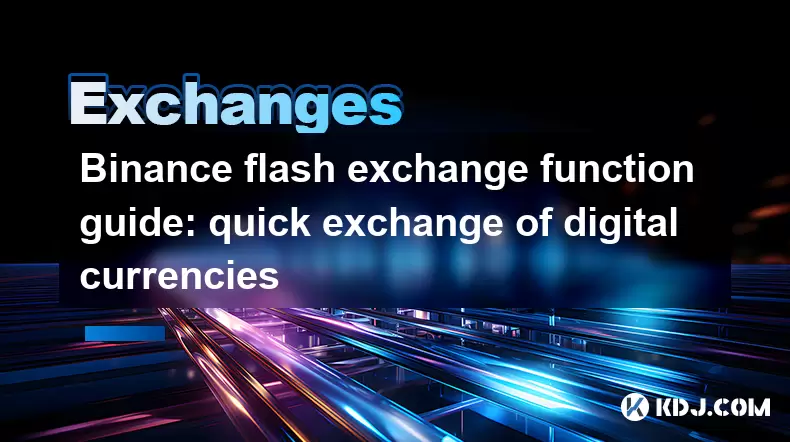
Binance flash exchange function guide: quick exchange of digital currencies
Jun 23,2025 at 12:29pm
What is the Binance Flash Exchange Function?The Binance Flash Exchange function is a powerful tool designed to allow users to instantly swap between supported cryptocurrencies without the need for placing traditional buy/sell orders. This feature simplifies the trading process by offering a direct exchange mechanism, eliminating the requirement to conve...

Binance spot market analysis: seize the best time to buy and sell
Jun 19,2025 at 04:56pm
Understanding the Binance Spot MarketThe Binance spot market is one of the most popular platforms for cryptocurrency trading globally. It allows users to trade digital assets at current market prices, making it essential for traders aiming to buy low and sell high. Unlike futures or margin trading, spot trading involves direct ownership of the asset aft...

Binance fund management secrets: reasonable allocation to increase income
Jun 22,2025 at 02:29pm
Understanding Binance Fund ManagementBinance fund management involves strategic allocation of your cryptocurrency assets to optimize returns while managing risk. The key to successful fund management lies in understanding how different investment options on the Binance platform can be utilized to create a diversified portfolio. This includes spot tradin...

Binance trading pair selection skills: find the best buying and selling combination
Jun 23,2025 at 02:49am
Understanding the Basics of Trading Pairs on BinanceBefore diving into trading pair selection skills, it's essential to understand what a trading pair is. On Binance, a trading pair refers to two cryptocurrencies that can be traded against each other. For example, BTC/USDT means Bitcoin is being traded against Tether. Each trading pair has its own liqui...

Binance new coin mining strategy: participate in Launchpool to earn income
Jun 23,2025 at 11:56am
What is Binance Launchpool and how does it work?Binance Launchpool is a feature introduced by the world’s largest cryptocurrency exchange, Binance, to allow users to earn new tokens through staking. This platform enables users to stake their existing cryptocurrencies (such as BNB, BUSD, or other supported assets) in exchange for newly launched tokens. T...

Binance financial management guide: ways to increase the value of idle assets
Jun 19,2025 at 11:22pm
Understanding Idle Assets in the Cryptocurrency SpaceIn the fast-paced world of cryptocurrency, idle assets refer to digital currencies that are not actively being used for trading, staking, or yield farming. Holding these funds in a wallet without utilizing them means missing out on potential growth opportunities. Binance, as one of the leading platfor...

Binance flash exchange function guide: quick exchange of digital currencies
Jun 23,2025 at 12:29pm
What is the Binance Flash Exchange Function?The Binance Flash Exchange function is a powerful tool designed to allow users to instantly swap between supported cryptocurrencies without the need for placing traditional buy/sell orders. This feature simplifies the trading process by offering a direct exchange mechanism, eliminating the requirement to conve...
See all articles

























































































